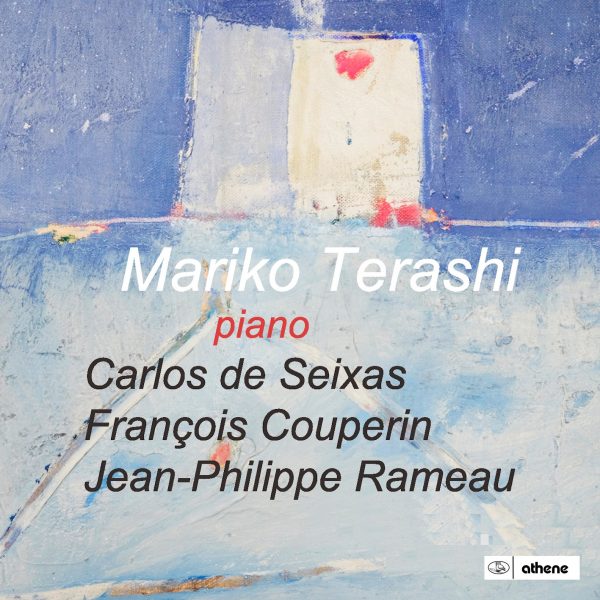Fanfare
This release is a reissue of a recording that was made in Japan and issued there in 2016. I approached it with a certain degree of skepticism, since I have felt that keyboard music of the French Baroque translates to the modern piano less well than does that of J. S. Bach. The Japanese-born, French-trained pianist Mariko Terashi has proved me wrong, with a recital of pieces by Jean- Philippe Rameau and François Couperin that is thoroughly engaging.
In an essay in the accompanying booklet, Terashi describes how she developed her approach to this music under the tutelage of French harpsichordist Huguette Dreyfus, who advised her to pay close attention to ornamentation, executing it completely and exactly, and to be guided by original editions and composers’ manuscripts rather than edited versions. This preparation shows in her very persuasive performances. Her touch seems entirely appropriate for the music, neither too percussive nor too delicate, neither too detaché nor too legato. Textures are always clear, and the balance between her two hands is well judged, affording the opportunity for telling left-hand colorations. Her playing is rhythmically lively without being boisterous and possesses a refined, understated eloquence that seems characteristically French. Comparisons between her Rameau performances and the excellent ones of harpsichordists William Christie (Harmonia Mundi) and Mahan Esfahani (Hyperion) disclose differences going beyond the obvious contrast in sound between their respective instruments—the spiky incisiveness of the harpsichord’s plucked strings versus the mellower, bell-like tone Terashi elicits from the piano. Her tempos in individual pieces may be faster or slower than theirs but are persuasive, except perhaps in “Les niais de Sologne,” where the livelier accounts of the two harpsichordists are more effective, although she picks up the pace in the two doubles. She is generally less elastic in tempo than they, more discreet in applying distensions for purposes of characterization—this contrast is especially apparent in “L’entretien des Muses” and “Les tendres plaintes”—but she does make effective use of subtle rubato and dynamic shadings. Terashi’s renditions of the Couperin pieces are equally successful, conveying their gravity and noble elegance.
One of the three composers on the program, of course, is not French but Portuguese. The notes for this release inform us that Carlos de Seixas (1704-1742), in his brief lifetime, was able to complete over 700 compositions, but unfortunately a “huge portion” of his output was lost in the catastrophic Lisbon earthquake of 1755. His surviving works include 104 compositions for the keyboard. His style is obviously different from that of his French discmates and somewhat resembles that of Domenico Scarlatti, with whom he had considerable contact during the period when both composers were employed by the Portuguese royal court. Like Scarlatti’s sonatas, the Seixas works offered here are highly inventive and entertaining, and Terashi’s playing is as adept in the Seixas works as in those of the French composers.
The sound of the recording is spacious and clear, with well-defined piano tone. The accompanying booklet appears to be a French project, since the French versions of everything are placed first, followed by the English. It is puzzling, therefore, to find in the track listing repeated references to “le opera,” instead of the correct “l’opera.” In fact, there are numerous other mistakes in the French in this listing, involving missing accents, failure to use the plural of an adjective, and misspellings. Terashi herself contributed the essays on each composer, and since no translator is credited, it appears that she is responsible for the English version as well as the French. The former, too, could have benefitted from better editing, which would have eliminated a few unidiomatic usages and rectified the omission of required accents in certain French words and names (the accents do appear in the French version).
Terashi’s recital has persuaded me that performances of French Baroque keyboard works on the piano can be satisfying if sensitively executed, and the Seixas sonatas are a welcome bonus, because of their rarity and worth. Overall, this release offers the listener much pleasure.
@divineartrecordingsgroup
A First Inversion Company
Registered Office:
176-178 Pontefract Road, Cudworth, Barnsley S72 8BE
+44 1226 596703
Fort Worth, TX 76110
+1.682.233.4978




![🎧 Listen now to the @purcellsingers' first single from their upcoming album, #ASpotlessRose! ➡️ listn.fm/aspotlessrose [in bio]](https://scontent-dfw5-2.cdninstagram.com/v/t51.71878-15/642752592_1424641949105789_8815810652567824072_n.jpg?stp=dst-jpg_e35_tt6&_nc_cat=106&ccb=7-5&_nc_sid=18de74&efg=eyJlZmdfdGFnIjoiQ0xJUFMuYmVzdF9pbWFnZV91cmxnZW4uQzMifQ%3D%3D&_nc_ohc=aY1NGfNpOoYQ7kNvwE1rryo&_nc_oc=AdmnZwuLFYSJYDLdgoH7LrmXVJ36fiWWmElyEQI7Jx3iS6WF2Po81uN3dFsXm5IatNU&_nc_zt=23&_nc_ht=scontent-dfw5-2.cdninstagram.com&edm=ANo9K5cEAAAA&_nc_gid=mef7a5ibTFksrSQDg6T5sg&_nc_tpa=Q5bMBQEHfXyCRldqLJoZ5QX8FFzqI_Ripc_XwGxptKC6XUwFXaKjoYycYoztPtCDoe1Ncl2yPns9SRm61w&oh=00_Afxk8QFx_4xxQQY6c-X5OSOKl0-xD2y6Qgjb2SvaZ4X1bA&oe=69AE2BC1)







